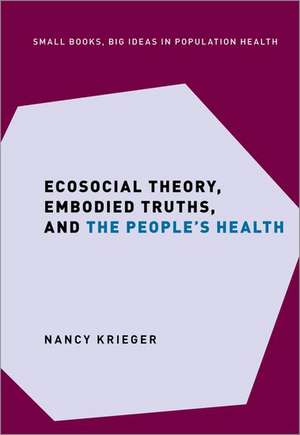Ecosocial Theory, Embodied Truths, and the People's Health: Small Books Big Ideas in Population Health
Autor Nancy Kriegeren Limba Engleză Hardback – 9 noi 2021
Preț: 170.01 lei
Preț vechi: 220.15 lei
-23% Nou
Puncte Express: 255
Preț estimativ în valută:
32.53€ • 33.76$ • 27.19£
32.53€ • 33.76$ • 27.19£
Carte disponibilă
Livrare economică 11-17 februarie
Livrare express 11-15 februarie pentru 74.97 lei
Preluare comenzi: 021 569.72.76
Specificații
ISBN-13: 9780197510728
ISBN-10: 0197510728
Pagini: 352
Ilustrații: 6 figures and tables
Dimensiuni: 170 x 124 x 25 mm
Greutate: 0.39 kg
Editura: Oxford University Press
Colecția OUP USA
Seria Small Books Big Ideas in Population Health
Locul publicării:New York, United States
ISBN-10: 0197510728
Pagini: 352
Ilustrații: 6 figures and tables
Dimensiuni: 170 x 124 x 25 mm
Greutate: 0.39 kg
Editura: Oxford University Press
Colecția OUP USA
Seria Small Books Big Ideas in Population Health
Locul publicării:New York, United States
Recenzii
A tour de force, Nancy Krieger's latest book weaves together decades of her own pioneering work integrating ecosocial theory, empirical research, and transformative policy and politics. This clear-headed cri de coeur is guided by Krieger's dazzling intellect, deep historical and contextual understanding, methodological knowhow, and above all is motivated by her lifetime of commitment to social and health justice.
In this landmark book, Nancy Krieger makes a compelling case for not simply working to address health inequities but grounding that work firmly in ecosocial theory and a deep understanding of the 'embodied truths our bodies tell.' A masterpiece, from one of the most important public health scholars of the last half century.
Building on decades of research, Nancy Krieger's eloquent writing takes us on a journey through history, science, and sociology to peel back surface explanations and reveal what truly shapes our health. This exposé of how our bodies reflect the embodied truths of society should be required reading for anyone seeking to understand health disparities.
This book connects all the dots—structural racism, class, power, gender, white supremacist culture, policy, ableism, and more—providing the most elegant and accessible explanation of how they all interact, connect, and shape not only embodied health but our environment and public policy. The stories, the data, and the analysis are deftly on point. This book is an absolute game changer.
This book provides a clear, accessible entry into one of Nancy Krieger's main contributions to public health literature—the ecosocial theory of disease distribution—with helpful examples for the application and importance of this theory for a general audience. Many communities of color will resonate with her explanation of the interdependence of societal and environmental situations on unequal and disparate health outcomes.
Nancy Krieger's groundbreaking concept of ecosocial theory has influenced a generation of environmental and public health scholars. Her expanded framework on discovering truths explores how diverse points of pollution, social stratification, and poverty intersect through the human body. This is a must-read for anyone seeking to advance environmental and racial justice in the public health field.
Nancy Krieger's conceptual thinking has been pushing the boundaries of epidemiological theory for decades now. This 'small book' will rapidly become essential reading for all those who use epidemiology to tackle the multiple dimensions of inequality affecting our societies.
In this landmark book, Nancy Krieger makes a compelling case for not simply working to address health inequities but grounding that work firmly in ecosocial theory and a deep understanding of the 'embodied truths our bodies tell.' A masterpiece, from one of the most important public health scholars of the last half century.
Building on decades of research, Nancy Krieger's eloquent writing takes us on a journey through history, science, and sociology to peel back surface explanations and reveal what truly shapes our health. This exposé of how our bodies reflect the embodied truths of society should be required reading for anyone seeking to understand health disparities.
This book connects all the dots—structural racism, class, power, gender, white supremacist culture, policy, ableism, and more—providing the most elegant and accessible explanation of how they all interact, connect, and shape not only embodied health but our environment and public policy. The stories, the data, and the analysis are deftly on point. This book is an absolute game changer.
This book provides a clear, accessible entry into one of Nancy Krieger's main contributions to public health literature—the ecosocial theory of disease distribution—with helpful examples for the application and importance of this theory for a general audience. Many communities of color will resonate with her explanation of the interdependence of societal and environmental situations on unequal and disparate health outcomes.
Nancy Krieger's groundbreaking concept of ecosocial theory has influenced a generation of environmental and public health scholars. Her expanded framework on discovering truths explores how diverse points of pollution, social stratification, and poverty intersect through the human body. This is a must-read for anyone seeking to advance environmental and racial justice in the public health field.
Nancy Krieger's conceptual thinking has been pushing the boundaries of epidemiological theory for decades now. This 'small book' will rapidly become essential reading for all those who use epidemiology to tackle the multiple dimensions of inequality affecting our societies.
Notă biografică
Nancy Krieger, PhD, is Professor of Social Epidemiology and American Cancer Society Clinical Research Professor at the Harvard T.H. Chan School of Public Health (HSPH) and Director of the HSPH Interdisciplinary Concentration on Women, Gender, and Health. She is an internationally recognized social epidemiologist with a background in biochemistry, philosophy of science, and history of public health. In 2004, she became an ISI highly cited scientist and has over thirty years of activism involving social justice, science, and health.


